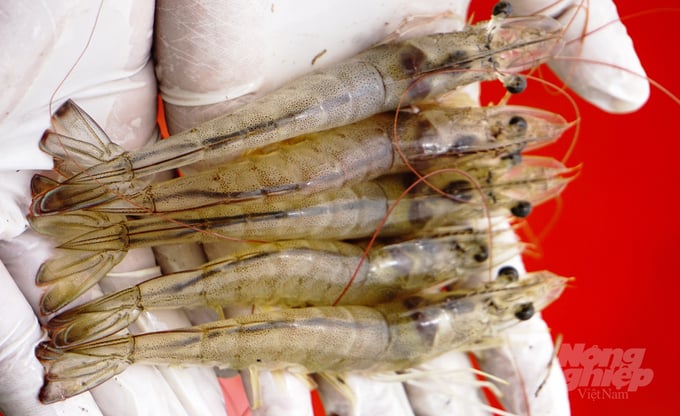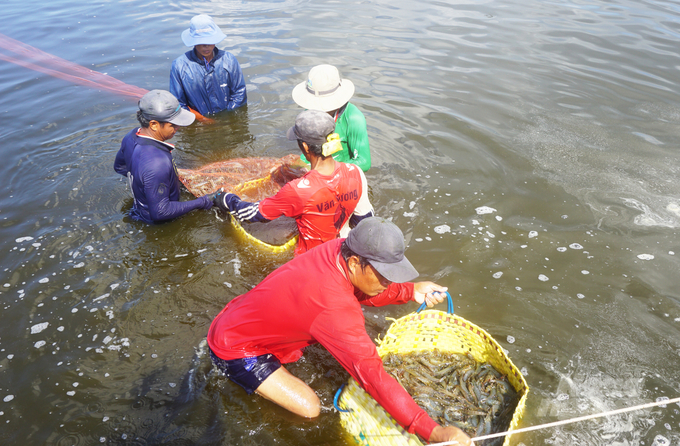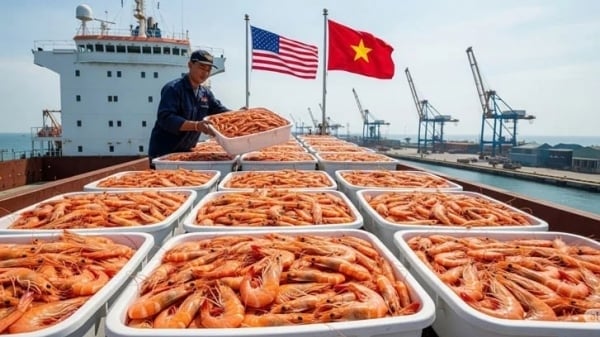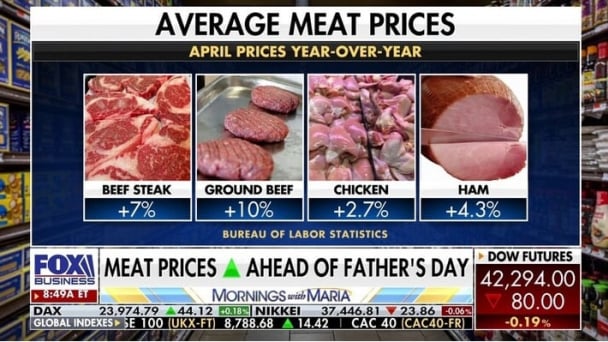June 14, 2025 | 19:25 GMT +7
June 14, 2025 | 19:25 GMT +7
Hotline: 0913.378.918
June 14, 2025 | 19:25 GMT +7
Hotline: 0913.378.918

Shrimps in the Mekong Delta. Photo: Huu Duc.
The Mekong Delta is in the shrimp harvest season 2 of the year. Many brackish shrimp farmers in coastal areas think that shrimp farming in this crop faces many difficulties. Still, with intensive farming ponds applying high technology, reasonable water control will limit disease risks and achieve high productivity.
Currently, the price of raw shrimp in the region is relatively high. The supply keeps a stable supply and demand for processing factories. However, from now until the end of the year, enterprises said that the pressure for export contracts is not too intense due to global inflation, so it is challenging to forecast consumption as expected.
Large supplies strongly influence the shrimp export market from India and Ecuador. These are two superpowers of shrimp farming with high growth rates. Peeled fresh shrimp from Ecuador packed in bulk infringes on the US market with the advantage of immediate sea shipping and low shipping costs, from US$ 500-4,000/container. While seafood products from Asia are exported to the US, transportation costs are 3-4 times higher.
It is forecasted that in 2022, global shrimp production will be over 5 million tonnes per year, with an average growth rate of 5% per year. In particular, China is a large shrimp farming country and importer.
China has the world's top shrimp production for domestic consumption with thousands of processing factories and is also the largest shrimp exporter to the US. China buys Vietnamese shrimp through traders and small seafood processing factories, mainly buying only boiled fresh and black tiger shrimp from Bac Lieu and Ca Mau provinces.
Mr. Ho Quoc Luc, Chairman of the Board of Directors of Sao Ta Food Processing Joint Stock Company (Fimex VN), said: The shrimp export market is facing a disadvantage. In Europe, because the British pound and the euro depreciated about 12%, the Japanese yen weakened, declining nearly 14-16%, so the competitiveness of Vietnamese shrimp products weakened when exported to other markets.
Meanwhile, although the dong against the US dollar has a slight advantage, the US market faces fierce competition from shrimp from India and Ecuador.
Facing the volatile "shrimp market" situation and being affected by the financial and monetary crisis, some shrimp exporters seek to keep their advantage by redirecting the export market. Vietnamese shrimp choose the near route to reduce freight costs.

Farmers harvest shrimps in Soc Trang province. Photo: Huu Duc.
Over the years, the position of Vietnamese shrimp products for export has been confirmed in the world market. Vietnam's shrimp industry grows about 8% yearly, higher than the world average. Vietnam continues to maximize its strengths of meticulously processed and deeply processed shrimp.
According to Mr. Luc, the Japanese market requires sophisticated and meticulous processing techniques in line with the processing capacity of Vietnamese enterprises. Especially in the context that domestic raw shrimp is decreasing because at the end of the season, there are fewer and fewer processed shrimp products sold to Japan and Korea, and they still have an advantage over other countries.
Currently, Vietnamese shrimp is maintaining its leading position in Japan, Korea, the UK, and Australia and is increasing its market share in the EU. Vietnamese shrimp is trying to keep its market share in China, and focusing on deep processing continues to maintain its market share in the US. The market share of Vietnamese shrimp in the US is about 10%.
In the first six months of 2022, shrimp exports in our country achieved positive growth. However, in the last six months of the year, the conflict between Russia and Ukraine had a substantial impact on the world economic situation, causing many countries to fall into inflation, which affected significant consumer markets.
The Directorate of Fisheries has set a target that in 2022, the shrimp farming area will reach 750,000 hectares (black tiger shrimp of 625,000 hectares, white shrimp of 125,000 hectares); shrimp production of all kinds is about 980,000 tonnes, of which black tiger shrimp of 275,000 tonnes, white leg shrimp of 675,000 tonnes, the rest are other shrimps; export turnover is estimated at US$ 4 billion (expected to increase by 2.56% compared to 2021).
To achieve the above goals, the Directorate of Fisheries also sets out essential tasks and solutions, such as strengthening the application of new science and technology to improve productivity, product quality, and production efficiency and meet the needs of domestic and international markets.
Translated by Ha Phuc

(VAN) Noting risks, report examines impacts of avian influenza, changing trade patterns since 2022, fish fraud, and shipping industry’s net-zero goals.

(VAN) Mr. Tran Quang Bao, General Director of the Forestry and Forest Protection Department, met and worked with the International Wood Products Association to promote cooperation in the field of timber trade.

(VAN) China's outbound shipments of rare earths in May jumped 23% on the month to their highest in a year, though Beijing's export curbs on some of the critical minerals halted some overseas sales.

(VAN) To sustain capital flow, administrative reform alone is not enough; what farmers truly need is an ecosystem where both government and businesses grow together in support.

(VAN) Vietnam and the United States are proactively working together, each in their own way, to ensure that every container of agricultural goods carries not just products, but also long-term trust and value.

(VAN) Stores have started selling rice from the government’s stockpile to feed demand for the staple.

(VAN) Omaha Steaks CEO says rebuilding cattle herds will take about a year to ease price pressures.